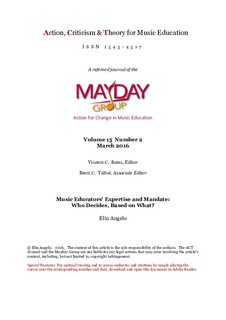Music educators' expertise and mandate: Who decides, based on what?
Journal article, Peer reviewed
Published version
Permanent lenke
http://hdl.handle.net/11250/2566637Utgivelsesdato
2016Metadata
Vis full innførselSamlinger
- Institutt for lærerutdanning [3811]
- Publikasjoner fra CRIStin - NTNU [38679]
Originalversjon
Action, Criticism, and Theory for Music Education (ACT). 2016, 15 (2), 178-203.Sammendrag
Who should define music educators’ expertise and mandate, and on what basis? Is this for example individual music educators, diverse collectives, employment institutions or political frameworks? How can one discuss professional quality and codes of ethic in this field, where these questions inseparably adhere to personal qualities and quality of a life? Or where such questions are already banned to those both outside and inside specific expert communities? This article proposes MEPRUN — music educators’ professional understanding — as a vital concept to facilitate such reflections, focusing on power, identity and knowledge on personal, collective, institutional and political level. This concept is employed in studies about a jazz pedagogue, a rural music teacher in a combined position, a French horn pedagogue, and a Balinese gamelan pedagogue (Angelo, 2015a, 2015b, 2013, 2012). The article contributes to more articulated knowledge on what forms music educators practices, and serves to qualify the discussions in and around this field. Keywords: professional understanding, music education, expertise, mandate, professional dilemmas. Music educators' expertise and mandate: Who decides, based on what?

